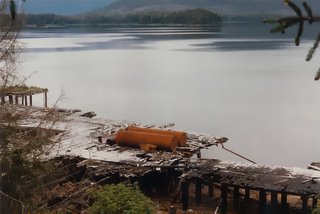Equal rights: the common thread

Some days when I think about blogging there is a thread stringing together a number of articles, e-mails and conversations in the past 24 hours. In the last day there has been a deluge of information on special privileges to our fish resources that seems destined to wind up here. One reader from Western Alaska (don't ever underestimate those Western Alaskans) must have picked up on where I was going with the "elephant in the room" thread and sent me Teddy Roosevelt's famous 1910 speech on nationalism.
This old cannery is a little far gone, but maybe it would grandfather in for some processor quota shares.
Of course the elephant in the room I refer to is priviledged access to all the fishery resources by the processing sector, that many don't seem to want to admit is there. You have to have worked in the bowels of the industry to see what direction people are going in. But you can't say much until you get something solid, like the processor who said, "We bought the plant for it's production history." Read that "processor quota shares in the future."
And that was a salmon plant and not that recently either. I heard today that another of the big processing companies bought a small salmon processor in Bristol Bay. Another of the "big three" acquired a going concern processor on the other side of the Peninsula. Consolidation has been going on throughout the entire history of the industrialized chapter of the Alaska seafood business though.
Getting big enough to achieve a critical mass of efficiency of scale that is unbeatable is the Walmart way and the aspiration of any corporation. But States are looking askance at Walmart building a world empire basically on the backs of it's minimal wage empolyees, without health benefits. And the effects on downtowns everywhere is, well you know.
Do we need to disrupt all the downtowns of coastal Alaska communities before someone figures out that processor quota shares are building world fish processing companies on the backs of lower paid fishermen? If fishermen are even going to be needed. The definition of a fisherman includes being an independent businessman. Fishermen that would willingly give that up, in some versions of "rationalization," are selling their birthright and really aren't fishermen anymore. Not my opinion, just by definition.
I know fishermen are afraid of standing up to the processors for fear of getting cut off from their market. I set out to work in the processing industry, with just the right degree and experience, etc., only to find that the yoke was hard and the burden heavy. I was innovating like crazy but not having any fun. This can be remedied though. It is possible to get creative new blood in the processing sector, and give security to the fishermen as well. The solution? First read what Teddy Roosevelt said about prividedged access.
"Practical equality of opportunity for all citizens, when we achieve it, will have two great results. First, every man will have a fair chance to make of himself all that in him lies; to reach the highest point to which his capacities, unassisted by special privilege of his own and unhampered by the special privilege of others, can carry him, and to get for himself and his family substantially what he has earned. Second, equality of opportunity means that the commonwealth will get from every citizen the highest service of which he is capable. No man who carries the burden of the special privileges of another can give to the commonwealth that service to which it is fairly entitled."
Following this warning against special privilege, he warns of the dangers of the undue influence of special interests: "Now, this means that our government, National and State, must be freed from the sinister influence or control of special interests. Exactly as the special interests of cotton and slavery threatened our political integrity before the Civil War, so now the great special business interests too often control and corrupt the men and methods of government for their own profit."
The implication here is clear. That special priveleges will divide a society. This is the exact opposite of the direction Alaska needs to be heading to extract the most from it's seafood resources and to provide security and safety for the citizenry of it's coastal communities. If the way doesn't seem clear, talk to Paul Southland or Bob Waldrop.


0 Comments:
Post a Comment
<< Home